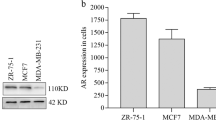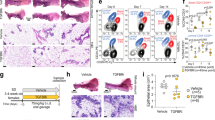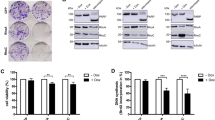Abstract
The phorbol ester, 12-O-tetradecanoylphorbol-13-acetate (TPA) (10 nM) produce a marked reduction in the growth, measured by thymidine uptake, of MCF-7 cells in full growth medium, but had only a small effect on MDA-MB-231 and T47D cells. Bryostatin alone also inhibited growth but to a lesser extent than seen with TPA. The effect of TPA on MCF-7 cells was partially reversed by bryostatin, added simultaneously or after TPA, suggesting bryostatin does not simply mimic TPA in this system. Even though both are believed to act via effects on protein kinase C, bryostatin appears to act as antagonist to the effect of TPA as well as a partial agonist on its own. When the oestrogen receptor positive MCF-7 and T47D cells were maintained in charcoal stripped serum, the increase in DNA synthesis on stimulation with oestradiol was inhibited with 50 nM TPA in MCF-7 cells but not in T47D cells. The effects of these treatments on the expression of two well characterised oestrogen responsive genes pNR2(pS2) and pNR100 (Cathepsin-D) were examined. Rather than preventing transcription of these oestrogen responsive genes, TPA alone increased pNR2 and pNR100 levels in MCF-7 cells and the combined effect of oestradiol and TPA had a marked synergistic effect in increasing the transcript levels of these genes. In T47D cells pNR2 transcripts were not detected and the increase in pNR100 mRNA levels were not affected by TPA. We conclude that the inhibitory effects of TPA on the growth stimulation of MCF-7 cells by oestradiol was not due to a general inhibition of the expression of oestrogen responsive genes. An alternative possibility examined was that the growth inhibitory effect of TPA on MCF-7 cells might be due to stimulation of TGF-beta 1, acting as an autocrine inhibitory growth factor. Oestradiol treatment of MCF-7 cells reduced the levels of TGF-beta 1 mRNA whereas TPA produced a marked increase. The combined effect of TPA and oestradiol further increased TGF-beta 1 mRNA above the levels seen with TPA alone. Bryostatin had little effect on TGF-beta 1 expression either alone or in combination with oestradiol. These observations are consistent with the hypothesis that the inhibitory effect of TPA on MCF-7 cells may be partly due to autocrine inhibition by TGF-beta 1.
This is a preview of subscription content, access via your institution
Access options
Subscribe to this journal
Receive 24 print issues and online access
$259.00 per year
only $10.79 per issue
Buy this article
- Purchase on Springer Link
- Instant access to full article PDF
Prices may be subject to local taxes which are calculated during checkout
Similar content being viewed by others
Author information
Authors and Affiliations
Rights and permissions
About this article
Cite this article
Nutt, J., Harris, A. & Lunec, J. Phorbol ester and bryostatin effects on growth and the expression of oestrogen responsive and TGF-β1 genes in breast tumour cells. Br J Cancer 64, 671–676 (1991). https://doi.org/10.1038/bjc.1991.379
Issue Date:
DOI: https://doi.org/10.1038/bjc.1991.379
This article is cited by
-
hEGR1 is induced by EGF, inhibited by gefitinib in bladder cell lines and related to EGF receptor levels in bladder tumours
British Journal of Cancer (2007)



